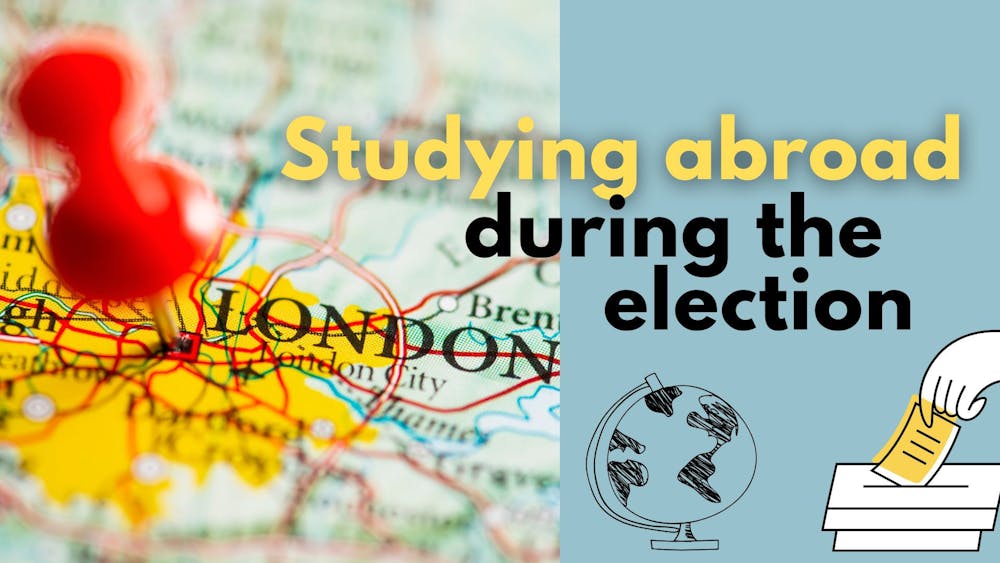Students studying abroad this fall experienced the election process hundreds of miles away from their UP communities while navigating international reactions to the election. For these students, the distance has posed additional challenges for staying engaged and processing the election results.
“It feels isolating when you find out big news like that when you’re so far away from home and everything comfortable to you,” sophomore nursing major Faith Zachariah said.
The Beacon spoke to four students in Salzburg, Austria, and London, England, about how they’ve navigated voting, stayed informed about US politics and processed the election results while away from UP.
Voting while abroad

Zachariah and Camryn Hines are both sophomore nursing students studying abroad in Salzburg, Austria. While they knew they would be abroad during the election, they still made sure to find ways to vote.
As a Washington State resident, Hines went to a courtroom in her hometown to register as an absentee voter a few days before leaving for Salzburg. This permitted Hines to vote online from Salzburg.
Though Hines voted online, Zachariah’s family mailed her ballot to her internationally. She filled out the ballot and mailed it back to her family to be dropped off at a ballot box in California. According to Zachariah, this process was expensive, and the mailing was time-consuming but ultimately worthwhile as Zachariah felt more involved with her hometown community.
European perspectives on the election
In addition to UP study abroad students' investment in the election, Hines says her professors in Salzburg also cared about the race’s results because of issues like the Russia-Ukraine war.
In recent years, Trump has questioned US support for Ukraine, claiming the war is draining the US military of its resources. Combined with his criticism of NATO, these statements have unsettled some European nations.
Additionally, leading up to the election, Hines found that several people associated her with being a Trump supporter when they learned she was American.
For Zachariah, navigating European stereotypes of Americans presented a unique challenge to her. According to Zachariah, some Europeans didn’t believe she was American because they assumed Americans were white.
These assumptions reflect broader Eurocentric and xenophobic attitudes that equate nationality with race, according to a 2022 study.
“A lot of people don’t see brown or Black [people] or anyone in between as American,” Zachariah said. “I’ve been told to my face that I’m not American by a European who would not believe me.”
Navigating community post-election
Casey James, a junior theater and music double major studying abroad in London, saw the results the moment she woke up on Nov. 6. For her, Donald Trump’s election elicited feelings of heartbreak, devastation and confusion. As a transgender person and theatermaker, James says her existence is already cast to “the fringes of society.”
“Things are already very, very difficult for people in my community,” James said. “I know they will only continue to get worse under the Trump administration, and it breaks my heart.”
At the same time, James acknowledges the privilege she feels she has in calling a progressive state like Oregon home. However, she can’t help but think of the lives that will be made more difficult because of Trump’s election.
“I think that this was a good wake-up call,” James said. “And it kind of shook a belief that I didn’t even realize I had, that I was holding onto my government, thinking that it was going to fix things and everything was going to be better.”
Also studying in London, junior theater and arts administration double major Zora Richardson grappled with knowing that the election results would impact her community at home.
“In general, I feel almost guilty for not being with my friends and family,” Richardson said. “And you know, I’m queer, and I have a lot of friends who I know are really scared right now, and it’s hard not to be able to be with them and provide comfort and support.”

For now, James and Richardson are focused on supporting the friends they have with them abroad. Richardson notes that most Americans in the program have also expressed progressive political views, leading her to feel part of a unified community in London.
Londoners have shown James a variety of reactions to the election results, from condolences to jokes. During orientation, study abroad orientation leaders warned James that people might make light of the election because American politics sometimes appears distant to Europeans, according to James.
“It’s been nice to have the disconnection,” James said. “And it also hurts a little bit that people don’t realize how truly catastrophic it will be.”
Editor’s Note: The Beacon reached out to seven students about processing the election abroad, including public outreach on social media. In our reporting, The Beacon was unable to reach students studying abroad who expressed support for President-elect Donald Trump.
Taylor Helle is a News Reporter for The Beacon. She can be reached at helle25@up.edu.









